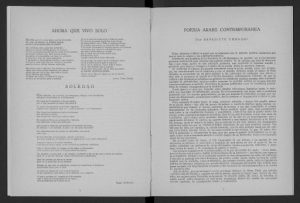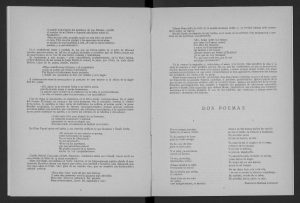Jack Clift is a doctoral researcher and translator affiliated with the Multilingual Locals, Significant Geographies (MULOSIGE) project.
Benedicto Chuaqui – Poesía árabe contemporánea
Contemporary Arabic Poetry

Al-Motamid 25, Tetouan March 1953. Source: Spanish National Library. 1
Anything that pertains to poetic material – whatever its country of origin and whoever has so diligently cultivated it – is a matter of great complexity and difficulty.
It is only the kindness of the editor-in-chief of Al-Motamid, Trina Mercader, that has sensed, in my modest self, the ability to address the creative aspect of a culture that is so difficult to unravel; a culture that demands, as well as profound intuitiveness, knowledge that is sufficiently wide and unsparing to accommodate the gamut of Arabic poetry in our times [1].
If we are to include more recent poetry in this endeavour, then this problem becomes even more acute, as relations with the continent of Europe and with the wider world unfortunately tend to occupy a less prominent position than relations of other sorts when viewed from a literary perspective. The problem is further exacerbated when we emphasise the shocking fact – which is, nevertheless, plainly evident – that instances of

Al-Motamid 25, Tetouan March 1953. Source: Spanish National Library. 2
culture and of artistic expression in general are not only few and far between, but also often lack authenticity. This is because they do not normally give expression to the aesthetic reality of a country but rather to its conventionalisms, which themselves are often adorned with artificial vainglories or are defined by the fleeting popularity of artists who are acclaimed only by the average reader.
I have to disregard, too, the course that these quick observations might themselves take, delimited, as they are, by a pitiful lack of information that makes it impossible to discuss them further. This is the problem posed by the younger generations, who – in their attempts to address issues that remain contentious so that they might assert their own particular aesthetic approach – have a habit of sowing confusion and distorting critical thinking.
Whichever way we arrive at the crux of the matter, however, we can observe that Arabic poetry – within its broader frame – has foregrounded, over the course of many centuries, particular characteristics that define the spiritual tradition of this race and that constitute a common thread running through their mode of expression, which dates back thousands of years. Heaven knows there are few other peoples who have remained so faithful to their human and psychological constitution as the Arab people. When viewed in broad brushstrokes, their poetry, as a genuine expression of their nature, betrays a number of key qualities, the origins of which must be sought in their lively and passionate temperament. Love, war, their expansive desert and a natural predilection for philosophy – alongside the love for the homeland that is evident in more recent examples – provide the solid basis from which rises the powerful breeze of their most prominent poets. The thread of romance that runs through their poetry, for instance, has been so powerful that it has been taken up even by their caliphs; this has often taken the form of songs dedicated to slave-women, which, in passing, underscore the gallantry and refinement of a race that, in the past, enjoyed particularly high esteem and that, in the present, has been forced to confront the tragic event of its liberation from the unyielding hand of its oppressors.
In the noble song of Antarah – the equivalent, for the Arabs, of El Cid – and in many of its successors, we can observe the epic, desolate tone of an era in which the clash of swords was the melody that tempered the mettle of men made temerarious yet magnanimous by war; an era of love, of conquest, of passion and pain.
The current custodians of Arabic poetry – so far this century, at least, as it is not yet possible, for the reasons outlined above, to speak in exclusive terms of the younger generations – draw richly on the formal tradition and the emotive content of their forebears. Although their ardent desire to do so is sometimes threatened by other fields of knowledge, it nevertheless does not lose, as already mentioned, its line of continuity with the past. We cannot deny, then, that although our homeland has endured the political hegemony of foreign interests, events of worldwide resonance have without a doubt broken through our impenetrable borders, at least partially, and have provided a note of contemporaneity to the poetry of our time.
And so, all of a sudden, we come face-to-face with the pained proclamation of May Ziyada, who entitles one of her poems: “Where is my Homeland?” In it, the author – who died in Beirut no more than ten years ago – employs a register that is only infrequently used in the poetry of our homeland. Pain, rebelliousness, societal critique: all of these are present in this poetic prose, within the frame of a robust structure, the frame of a profound and unsettled line of thinking:
When they called out the names of the Homelands, I wrote down the name of my Homeland and brought it to my lips, kissing it.
I was born in one city; my father was born in another city, my mother in another. Now I live in yet another city and the spectres of my soul move from one place to another. Which of these cities should I adopt and which should I defend?
This is the feeling of sadness and loss experienced by those who have no homeland; this is the cry for freedom that a poet makes; this is, perhaps, the hidden, collective desire that is to be found, possibly by some ironic twist of fate, in the voice of a woman, brave yet faltering.
We can compare the finality of Ziyada’s poems with the painful flow of the poems of Jorge Kehdi, although their works do converge, perhaps, in the vein of intimacy that runs through them. I met Kehdi briefly in Chile, while travelling from Bolivia. Far from the homeland, wounded, he writes:
They sanctified money and the wealthy
Sell their homeland in exchange for linen and velvet.
I was the object of misfortune since birth
And, wherever I went, misfortune was not far behind.
In what follows, we see him, at the height of his standing as a poet, call on death and plead with it:
Oh, horseman of good fortune! Preserve this unlucky poet,
Since death longs for this Damascene poet. [2]
Death, for the free, is the start of life – if only they understood! –
And life is, for the wicked and the unfeeling, death.
There is an atmosphere of desolation, of abandonment, in the contemporary Arabic lyric. It is the sign of the times. The poet cannot escape the rules that govern being human. But yet: the poet can raise the cry of the times, can heighten it, can make it food for the masses. Politics, societal shifts, economic gloom, oppression by unassailable powers: all these form heavy chains, metal cuffs that bind us, that squeeze us tightly, that bleed into our words; human beings cannot conceal their agony and the outlets of rebellion and grief are opened:
Every star dwells at a distance from each of its brothers,
Living in complete helplessness and solitude,
Burning, in vain, its own being,
Leisurely dispersing its own light into the sky.
These are the words of Elias Fayad; his verses corroborate what we have already said. As do those of Nasib Arida:
The incense of my heart burns,
Like a conflagration of blood. [3]
Is it not the time to free ourselves
From nations?
But in such a predicament,
What use are prayers?
My people will remain on the earth,
A slave of the conquerors.
Shafiq Ma’luf, [4] Shukr Allah al-Jurr and Al-Qarawi, who all now live in Brazil, make clear in their verses the pain of being in a foreign land.
Elia Abu Madi, now settled in North America, has a poetic disposition on which philosophical thinking has, by force, staked its claims, loudly and clearly. Jean Zalaquett Hachain, who has lived in Chile for a number of years, displays a delicate spirit that asserts itself through the filtering of his poetry to achieve the greatest quality:
You are sweeter, for me, than my sorrows.
Of all my fantasies, you are the fantasy I love most.
You are mine. You are the seductive light of sin.
To venerate you, I close my eyes and I pray.
Gibran Khalil Gibran occupies a full cycle of modern Arabic poetry in and of himself and, truthfully, any comment on his stature here is unnecessary.
Rashid Ayub, in some of his songs, is the poet of poverty. There is resignation and sadness in his words; let us listen:
Oh, leaves on the branches,
Which burn between the embers!
The years dug deep into me
And now I reside in isolation,
With neither hearth nor home.
How long will Fate hurt me?
Or is it that I am simply not human?
Do I, who was born to be a king, have to be
A beggar for eternity?
Now we see it: anguish, ostracism, love and death have jolted the life and work of many poets – and great ones too. Perhaps because of how the particular cycle of history that affects Arab countries unfolds, or perhaps because these Arab poets have had to set foot in foreign lands, these characteristics have come sharply into focus, taking the form of poems addressed to absent friends and lovers, of laments or of complaints.
These lines lack any kind of pretense. They are simply my impressions, gathered somewhat at random, as a sample of our spiritual richness and our possibilities. I have to omit much of what is happening in the artistic sphere, especially in faraway lands. Alongside those who advocate for the reclamation of what is rightly theirs, there necessarily have emerged – or will emerge – advocates of a new mode of expression, a grand and distinguished one. A mode of expression that must carry forward, buried deep within its core, the wavering sounds of the human tide, the voice of the peoples, which will begin to boom atop the burning mountains of morning.
[4] See here [insert hyperlink] for one of Ma’luf’s poems in this translation collection.


Leave A Comment